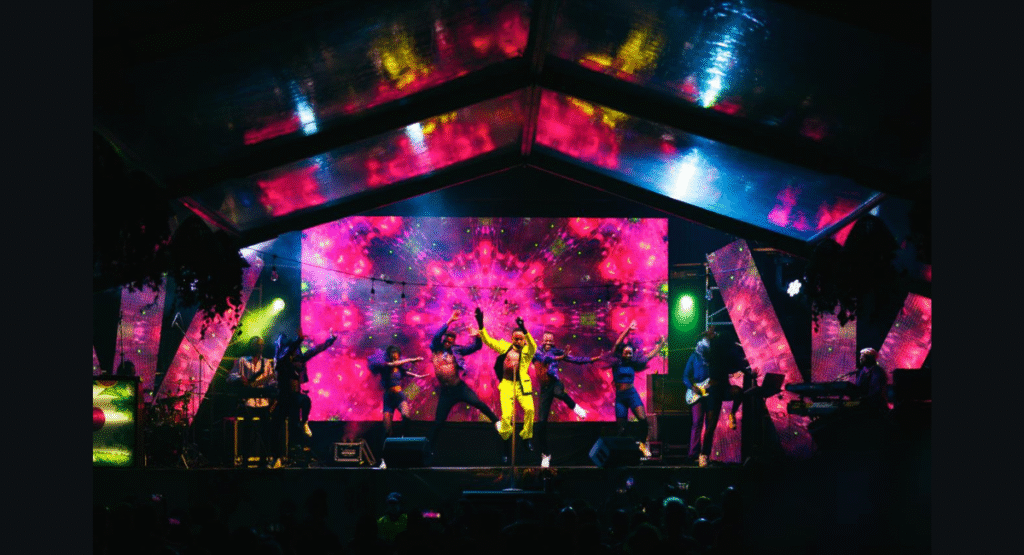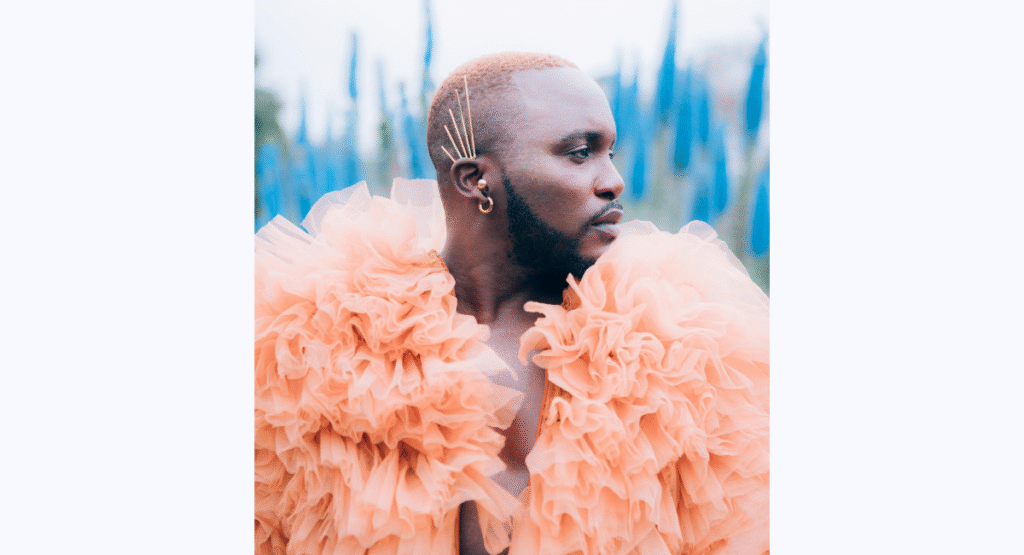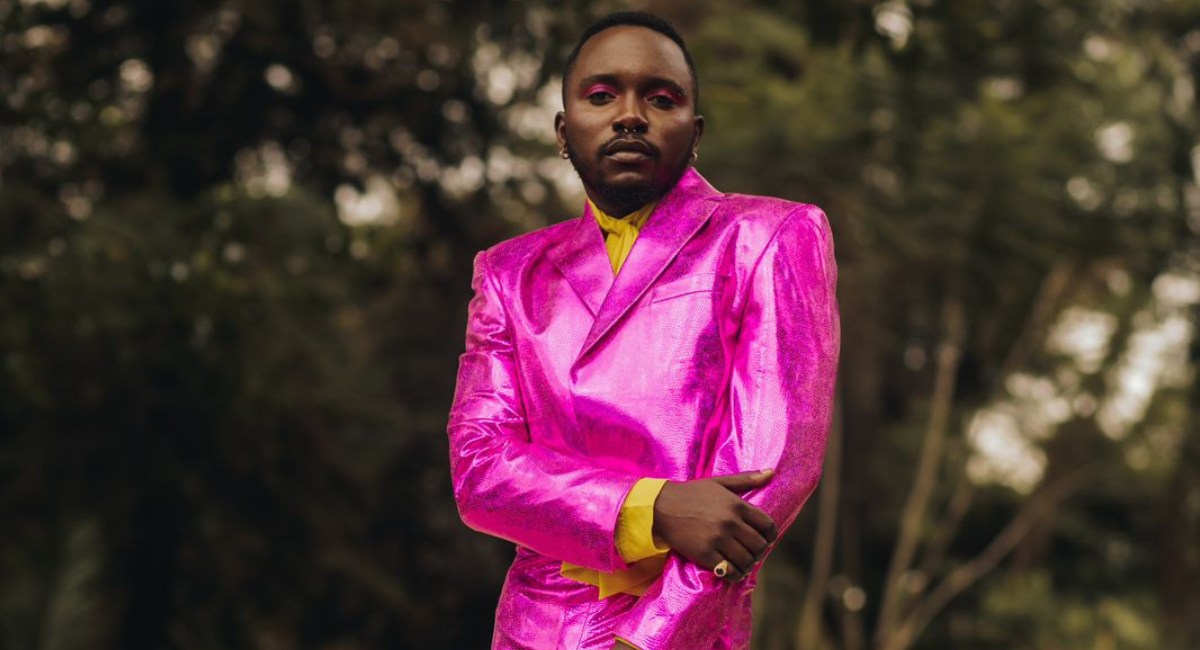Chimano embraces his individuality and theatrical flair — his fashion as unapologetic as his message of self-acceptance and LGBTQ+ visibility. Photograph: Courtesy of Willis Chimano
The former Sauti Sol singer reflects on his journey from secrecy to liberation and why he’s comfortable being seen as an LGBTQ role model even if he sometimes feels like an imposter.
by Beza Lealem
During their two decades touring the continent, few African music acts carried as much cultural weight as Sauti Sol. The Kenyan quartet helped redefine Afropop in East Africa, blending sleek harmonies and genre-blurring sounds with infectious charisma and their own distinctive brand of Swahili swagger. Whether performing for US presidents or winning MTV Music Awards in Europe and Africa, the chart-topping band transcended borders, playing to sold-out crowds from Lagos to London.
Yet for Willis Chimano, one quarter of the high-voltage band and its most exuberant member, life offstage was haunted by a silence that cut deeper than any lyric could convey. In a group whose public image rested on the heteronormative ideals of the boyband, Chimano struggled privately with the irony of concealing his sexuality while embodying flamboyance on stage. “I had to do everything in my power to keep [it] hidden,” he later recalled.
It wasn’t just an inner struggle. Behind the dapper charm and confident choreography was a young man grappling with a reality he had good reason to keep private. Kenya is one of 32 African countries that criminalise LGBTQ+ people, with consensual same-sex acts between men punishable by up to 14 years in prison — a colonial-era law that campaigners tried to overturn, but a high court challenge rejected in 2019.

On stage with Sauti Sol, Chimano, centre, commands the spotlight — the same light he would later reclaim for himself through music that celebrates truth and queer joy. Photograph: Courtesy of Willis Chimano
For Chimano, whose fame magnified every private struggle, the weight of the secret was immense. When his sexuality was eventually leaked without his consent, the experience forced him to confront a truth he had hoped to reveal on his own terms. But instead of evading or denying the unwanted speculation, he did what no pop star in Kenya had ever done before. In December 2021, Willis Chimano went to a national newspaper and came out publicly as gay.
“I am just laying everything bare; from now on, hakuna kujificha jificha (there is no more hiding). Sexuality does not define you. It is just about me putting myself out there, my creativity and living my truth,” he told the reporter who secured the ‘scoop’.
The news quickly reverberated around the world — from BBC headlines to noisy chatter among the band’s three million social media followers — prompting a wave of support from celebrities, activists and bystanders who saluted the star for his honesty and bravery. While some fans applauded Chimano, others relished the opportunity to spew hate at an openly gay African musician, both at home and across the wider continent. “There was so much vitriol. Oh my god, so much,” he said at the time.
Life was never the same again and, although the adjustment was mostly liberating, it was also sometimes agonising. Even so, the worst of his fears never came to pass. Sauti Sol did not crumble, and his own career did not implode. The band continued performing as a quartet for two more years after Chimano came out and, by the time it went on hiatus, he had already released a solo track. The enduring support of his bandmates — Savara Mudigi, Polycarp Otieno and Bien-Aimé Baraza — has led many to see them as allies.
Chimano’s survival as an artist, and later his success, was far from guaranteed. Kenya may be one of the least dangerous countries for LGBTQ people in East Africa — where prosecutions under its current anti-gay law are rare and public attitudes are more liberal than in Uganda and Ethiopia — but being gay can still be a harrowing experience in a country where criminalisation fuels homophobia. For high-profile figures, privilege brings its own risks and subtler forms of discrimination, as shown in 2022 when the police cancelled Chimano’s Love & Harmony concert in Nairobi, citing “security reasons,” a move many viewed as thinly veiled censorship against an openly gay performer.
Despite Kenya’s increasingly fraught climate — stoked by politicians backing the Family Protection Bill 2023 which seeks to “prohibit everything to do with homosexuality” — Chimano embraced his identity and began speaking with disarming candour. Before long, the musician found himself at the centre of a small but growing circle of celebrities challenging taboos around LGBTQ identity across the continent. The man who says he “wore a mask” during the early years of Sauti Sol so as to not “ruin the band’s chances of becoming bigger” had become a visible role model and a vocal advocate.
Chimano’s solo career charts that transformation in full, shifting from the collective identity of Sauti Sol to an unapologetically personal exploration of his own. Marked by his debut EP Heavy Is the Crown and singles such as Friday Feeling, this new chapter turns towards themes of identity, self-love and freedom, with music serving as both conversation and communion. For Chimano, each song doubles as testimony and defiance — a refusal to be pigeonholed, and a declaration that joy can thrive even in places where the law insists it should not exist.

Chimano wearing a ruffled peach outfit — a bold expression of the confidence and flair that now define his solo era. Photograph: Courtesy of Willis Chimano
That evolution was captured in Chimano’s recent appearance in London, where he staged “Chimano Live! Heavy Is the Crown: A One-Man Show” — backed by the Chakula programme at The Africa Centre as part of the ongoing UK–Kenya Season of Culture. Mixing his music with poignant storytelling and spontaneous moments of self-reflection, the performance was both a personal breakthrough and a symbolic moment for an LGBTQ entertainer seeking visibility beyond the continent.
It is against this backdrop — of using music as a vehicle for not only self-expression and survival but resistance and liberation — that our conversation unfolded.
Speaking frankly and punctuating his emotional set with wry humour, Chimano went on to retrace the contours of his career, from the dizzying heights of Sauti Sol’s fame to the deeply personal struggles of self-acceptance. What emerged was not only a portrait of an artist learning to inhabit his life authentically, but also a broader meditation on what it means to be a gay African in the public eye.
By turning vulnerability into visibility and rhythm into resilience, Chimano reminds us that out artists embody more than the work they create or the entertainment they provide.
Welcome to Fatteh.
Thank you for having me.
Tell us about your creative process. Is your music born from a spark of imagination?
I’ve had to form new habits now that I’m a solo artist. With the band, we had certain rituals that shaped our creativity — but on my own, I had to find my own way. For me, silence is powerful. Finding myself spiritually, pacing myself, and repeating mantras has become part of how I get into that creative zone. Sometimes that means recording an idea on my phone, sometimes just sitting in a quiet space to think it through.
After you came out, you said that your solo single Friday Feeling is “a true representation” of who you are. Why was that? And what inspired the song in the first place?
It was one of those songs that the melody came to me in a dream. I remember, I woke up, and I went to my friend’s floor, and I put on the voice, and I just started singing to them. I’ve always loved the 80s — the punk, the rock-star era, the disco. It was so liberating. That’s what Friday Feeling is about. Even the lyrics — “I’m setting myself free” and “ring the authorities”, were saying, ‘you know what I’m going to do and you’re not going to stop me’.
It just felt like I needed a liberating song especially as my first one after being in the band. I felt like I needed…an oh-my-God breaking-free kind of song.
Good ideas often come in dreams.
Yeah, they do.
You also said in the same song that we can “really get to know who Chimano is and that is a heavy crown to carry”. How did that moment of liberation feel?
I wouldn’t say there was a moment. It’s just been gradual. It’s been different milestones, because I had a lot of work to do on myself. I thought that by my mid-to-late 30s I’d have figured out, but I haven’t. The beauty is I freed myself from the pressure of needing to. That’s liberating — forgiving yourself for not having it all together and loving yourself unconditionally.
You live, you learn, and you move. It’s a journey that I’m still going through. There are moments when the crown feels heavy, when I give myself a hard time, but I’m in a much better place now. I’ve come to see that being human is an experiment — you’re always a work in progress.
How heavy is the crown now?
It’s very much lighter. At the end of it all, it’s carrying whatever you consider your failings, your experiences, how you see yourself. It’s just how you move through life with grace. It’s also about changing and changing how you view the world. It can be literally almost mind-bending.
It’s about how you react and how you get around to solving situations. It’s your basic outlook on the world. You can have a million people validating you, but one person is going to say some shit and that lingers with you. Learning how to get past that, how to shift your outlook, has been amazing.
I think that’s one of the reasons many see you as an LGBTQ role model. How do you feel about that?
If people see me that way, then I must be doing something right. Coming from Africa — especially East Africa — and living openly, loudly and unapologetically, I think I can take some credit. It shows others that representation matters, that they can see themselves in me.
Even if we don’t share the same circumstances or even the same region, seeing someone who looks like you makes you think, ‘I can do it too’. For me, it’s also a foundation — if I see someone building, then I know I can build as well.
During your formative years you were part of an award-winning Kenyan band. How did that shape your coming-out journey?
Wow! It had a huge effect, of course. Effect on how I present myself to the world in the beginning and probably, to an extent, it delayed my full coming-out, but everything in its own time, right?
It took quite a while for me to get into a zone of trusting and believing in myself — first of all as a human being before I started thinking about my sexuality. Because we’ve been taught to separate those things, like ‘he’s a good guy but he’s gay’. So, it’s about unlearning certain things for you to be able to merge yourself in the full context of who it is that you are.
Yes, you are who you are — gay, straight, whatever — but that isn’t the sole thing that defines you. You have things to contribute: taxes to pay, lives to change and your own life to live. You have a responsibility to make the world a better place than you found it. That really was a process.
What about the LGBTQ community?
I wasn’t fully part of the community when I was still in the band, and life just moved on. I’m just in a space where I feel like I’m re-acclimatising to being with people like me, to be with amazing souls like me. And that is a process. Sometimes I feel like an imposter in the community. And literally, sometimes I feel like I’m playing catch up.
I’m in a place where I want to learn first, before I even try to speak for or contribute to others. In the process, I’m also learning more about myself — because I truly want to learn. I think it starts from us just being at peace with ourselves, which is amazing.
Who did you look up to when you were coming out? How did you find the courage?
Oh, wow! I always went into loads of moments of deep reflection. I literally curated my own world in my head, immersing myself in Queen’s concerts, watching Freddie Mercury and imagining myself in that space. There was even a time when, during a tour, I had asked my microphone to be like his. Those were moments where I gifted myself certain queer aesthetics and connected with queer icons: Freddie Mercury, Elton John and Grace Jones.
Even though Prince wasn’t queer, I resonated with the rock-star energy of it all. And Frank Ocean — my God, I loved how demure he was, how he carries himself. So yeah, I created my own moments in my head, and to an extent, when I was on stage. I buried myself in fashion, my expression with clothes and how I wore my clothes, those guilty pleasures just made me happy, and they were just mine.
Whose reactions surprised you the most when you came out? Your bandmates or your family?
My bandmates were always supportive because they’re the ones who told me way back in 2009, “Okay, we know. Just take care of yourself. Let’s move on now.” They wanted to make sure that I was okay.
Outside of all the negativity, a lot of those who surprised me were some of my fans back home, who didn’t turn on me, who were just like, ‘Okay, finally, now we can move on to you actually creating a music without inhibitions’. I was just like, ‘oh, okay, thank you.’
You can focus on so many other things, but then you see people who don’t even know you yet and still show their love for you. In a society where they might be judged for that, they still stood by me. That surprised me, and I’m so thankful for that.
What’s your message to aspiring LGBTQ artists in countries like Ethiopia or Kenya, where their existence is criminalised and their identity is stigmatised?
I know it’s hard, I know it’s difficult — especially what it does to your mind and your state of being. Sometimes it can make you feel like you’re going crazy. Living your authentic self could cost you everything: your life, your family, your job. But just hang in there. Find community where you are. Find like-minded individuals who will be there to support you and be each other’s support. The rest will follow.
You’ll slowly figure it out. You’ll jump out of your shell, and you will thrive. The one thing about us is that when we set our mind to something, we thrive. Because the world is often unkind, we work 50 times harder — but we still thrive. Find community — the rest will follow. And remember, giving grace to yourselves is very, very important too.
Sometimes it’s your own blood that slows you down or hurts you, so you have to create community and family where you can. As human beings, we all need validation, not for ego, but simply to know, ‘I’m here, I’m loved, I’m safe’. You need to know you have a place to go, a space where you can reach the highest point of your artistry, your creativity, and your humanity. Community is definitely important.
I guess it’s a place where everyone’s crown feels less heavy.
Exactly that. Because everybody’s wearing similar crowns.
Thanks so much.
Thank you for having me.
This interview has been edited for brevity and clarity

